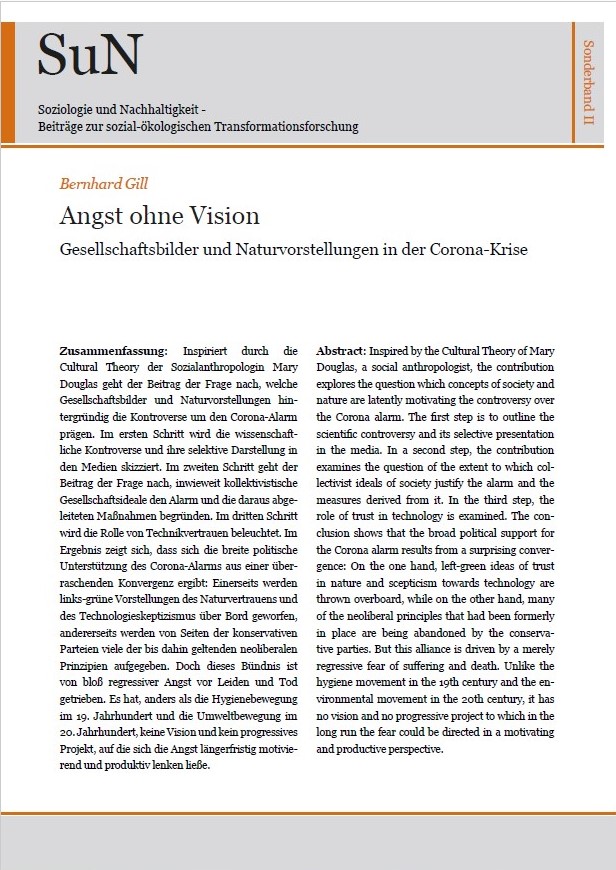Angst ohne Vision
Gesellschaftsbilder und Naturvorstellungen in der Corona-Krise
DOI:
https://doi.org/10.17879/sun-2020-2940Schlagworte:
Cultural Theorie, Gesellschaftsbilder, Naturvertrauen, Corona-AlarmAbstract
Inspiriert durch die Cultural Theory der Sozialanthropologin Mary Douglas geht der Beitrag der Frage nach, welche Gesellschaftsbilder und Naturvorstellungen hintergründig die Kontroverse um den Corona-Alarm prägen. Im ersten Schritt wird die wissenschaftliche Kontroverse und ihre selektive Darstellung in den Medien skizziert. Im zweiten Schritt geht der Beitrag der Frage nach, inwieweit kollektivistische Gesellschaftsideale den Alarm und die daraus abgeleiteten Maßnahmen begründen. Im dritten Schritt wird die Rolle von Technikvertrauen beleuchtet. Im Ergebnis zeigt sich, dass sich die breite politische Unterstützung des Corona-Alarms aus einer überraschenden Konvergenz ergibt: Einerseits werden links-grüne Vorstellungen des Naturvertrauens und des Technologieskeptizismus über Bord geworfen, andererseits werden von Seiten der konservativen Parteien viele der bis dahin geltenden neoliberalen Prinzipien aufgegeben. Doch dieses Bündnis ist von bloß regressiver Angst vor Leiden und Tod getrieben. Es hat, anders als die Hygienebewegung im 19. Jahrhundert und die Umweltbewegung im 20. Jahrhundert, keine Vision und kein progressives Projekt, auf die sich die Angst längerfristig motivierend und produktiv lenken ließe.
Inspired by the Cultural Theory of Mary Douglas, a social anthropologist, the contribution explores the question which concepts of society and nature are latently motivating the controversy over the Corona alarm. The first step is to outline the scientific controversy and its selective presentation in the media. In a second step, the contribution examines the question of the extent to which collectivist ideals of society justify the alarm and the measures derived from it. In the third step, the role of trust in technology is examined. The conclusion shows that the broad political support for the Corona alarm results from a surprising convergence: On the one hand, left-green ideas of trust in nature and scepticism towards technology are thrown overboard, while on the other hand, many of the neoliberal principles that had been formerly in place are being abandoned by the conservative parties. But this alliance is driven by a merely regressive fear of suffering and death. Unlike the hygiene movement in the 19th century and the environmental movement in the 20th century, it has no vision and no progressive project to which in the long run the fear could be directed in a motivating and productive perspective.
(editorial reviewed)





